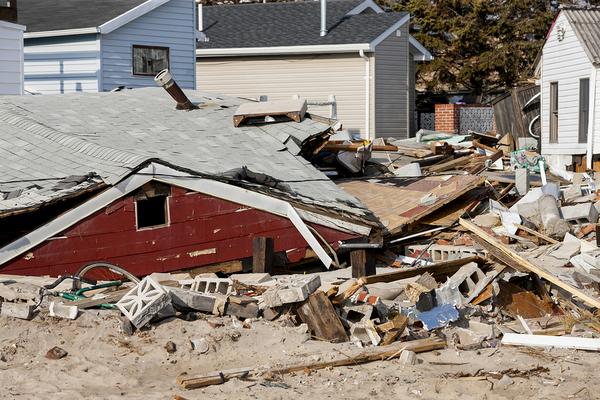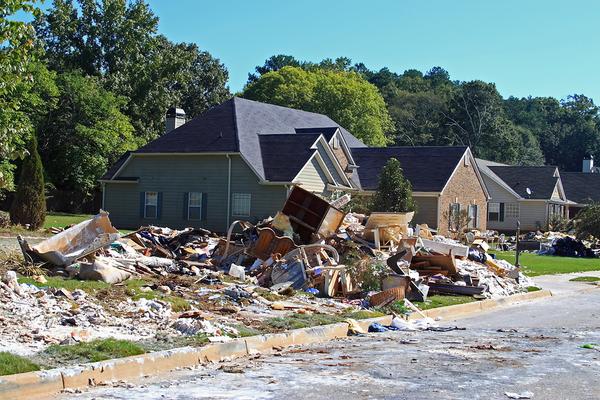Returning home after a major disaster can be both dangerous and difficult. Use care when entering a disaster area, and be ready to deal with the conditions at hand.
- See that your family is safe from flood, fire, or falling buildings.
- Cooperate fully with local authorities, rescue squad, and the American Red Cross.
- Walk or drive cautiously. Debris-filled streets are dangerous. Snakes and rodents may be a hazard. Washouts may weaken road and bridge structures and could collapse under a vehicle’s weight. Help locate shelter, food, clothing, transportation, medical supplies, and medical help.
- Obey health regulations for personal and community protection against disease epidemics. Report any violations.
- Set priorities. Accomplish the most important tasks first, but don’t overexert yourself.
- Be sure children are safe and being cared for at all times. Never leave young children alone or allow them to play in damaged buildings or areas that might be unsafe.
- Remember to help neighbors who may require special assistance: people with infants, elderly people, and people with disabilities.
- Keep a battery-operated radio with you to hear any emergency updates.
- Before you enter your home, check the house foundation, stairs, roof, and chimney for structural damage.
- If you have any doubts about safety, have your home inspected by a professional before entering. Be careful when entering a damaged building. Wear protective clothing on legs, arms, feet, and hands. Wear sturdy boots and rubber gloves when entering and while cleaning a flood-damaged home.
- Stay away from fallen or damaged electrical wires. They could still be live.
- Do not return to your home at night. Authorities will probably not allow it.
- Do not carry lanterns or torches; they could start a fire. Use a flashlight only.
- Watch out for animals, especially poisonous snakes that may have come into your home with the floodwaters. Use a stick to poke through debris.
- It is likely that your phone service will be out. If service is partially restored, use the phone only for life-threatening emergencies.
- Watch for nails, splinters, holes in walls or floors, wet or falling plaster, and undermined foundations.
- Open closets and cupboards carefully.
- Check the gas supply. If you smell gas or hear a blowing or hissing sound, open a window and quickly leave the building. Turn off the gas at the outside main valve if you can, and call the gas company from a neighbor’s home. If you turn off the gas for any reason, a professional must turn it back on.
- Check electricity. Do not use an electrical system that has been flooded until an electrician has checked it out. If you see sparks, broken or frayed wires, or if you smell hot insulation, turn off the electricity at the main fuse box or circuit breaker, and call an electrician for advice. In some cases, your municipality may have shut off the electricity. If this happens to you, make certain you turn off the electricity at the main fuse box or circuit breaker. Then you won’t be caught off guard if your power is suddenly restored.
- If you have flood insurance, call your agent. Take pictures of the damages. Keep good records of repair and cleaning costs.
- Get help from your local American Red Cross. They can provide a voucher so you can buy groceries, new clothing, medications, furnishings, and other items for daily living. Take your time and pace yourself.
- Check your electrical appliances. If any of the electrical appliances are wet, turn off the main power switch in the house. Unplug the appliance, and take it to a repair center.
- Check sewage and water lines. If you suspect damaged sewage lines, avoid using the toilets and call a plumber. Do not use water from a private supply until health authorities have tested it. Do not use water from a municipal supply unless health authorities have declared it safe for use.
- Clean up spilled medicines, bleaches, gasoline, or other flammable liquids.
- Try to protect your home from further damage. Patch holes.
- The mud left behind by floodwaters can contain sewage and chemicals. Clean and disinfect everything that got wet.
- If your basement is flooded, pump it out gradually (about one-third of the water per day) to avoid damage. The walls may collapse and the floor may buckle if the basement is pumped out while the surrounding ground is still waterlogged.
- Throw out cosmetics and medicines that have come into contact with floodwaters.
- If you can, stay at home and avoid driving to keep roads clear for emergency workers.
- Start cleanup as soon as possible, especially if flooding has occurred. Thoroughly dry and clean the house before trying to live in it. Delay permanent repairs until building is thoroughly dry.
- Take measures to control rodents and insects.
- Keep chemicals used for disinfecting and poisons used for insect and rodent control out of the reach of children.
Keep in mind...
It takes a long time to recover from a disaster. Take your time and pace yourself. Plan a reasonable amount of activity each day. Include children in cleanup and recovery activities when safe and appropriate. Watch for signs of stress in yourself and your family members. If you can’t shake feelings of despair, get professional help. While life will not be the same as before the disaster happened, you can and will recover.
For More Information
For more information on disaster preparedness and recovery visit the NC Disaster Information Center.
Rebuild Health Homes: Guide to Post-disaster Restoration for a Safe and Healthy Home
Adapted by Dr. Sarah Kirby, Extension Housing Specialist, North Carolina Cooperative Extension Service, NC State University, from University of Florida, Institute of Food and Agricultural Services’ Disaster Handbook.
Publication date: June 12, 2019
Reviewed/Revised: March 27, 2024
N.C. Cooperative Extension prohibits discrimination and harassment regardless of age, color, disability, family and marital status, gender identity, national origin, political beliefs, race, religion, sex (including pregnancy), sexual orientation and veteran status.


